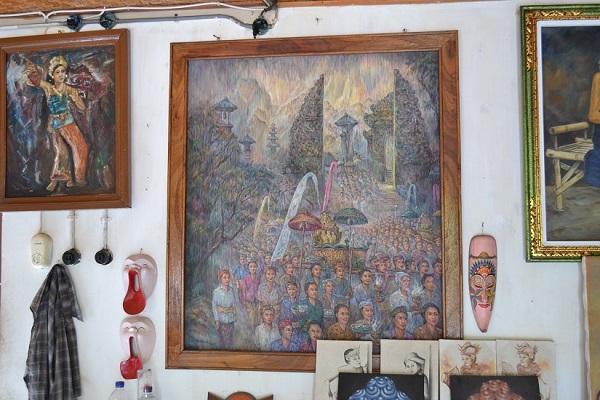Art for sale
7 January 2012
Lovina, Bali
“This one was done by my cousin, an old man”, we are told by the owner of the small art gallery in Lovina. He proudly points at a big painting on the main wall. But he is also casual, relaxed, as if we were some old friends stopping by for a cup of tea and a bit of gossip. There is such warmth and personal feeling in his demeanour, again the very opposite of our utterly reserved and strictly “professional” behaviour in the West. In similar situations, we overload the conversation with “expert” details and sophisticated analysis, enhanced by a perfect politeness, which does little to induce a sense of meaningful experience in the listener. All such sets of carefully constructed and safely neutral information leave her empty and poor in real life experience.
The man in Lovina was talking to us as if he’d known us for a long time, although we’d just stepped into his gallery for the first time a few minutes before. But his warm welcome and attention, his stories and willingness to have a meaningful communication (not to ‘explain’, but to exchange live stories with us) was utterly touching, and it has indeed left a unique mark on us. He was talking to us with the openness and warmth of a friend you share a glass of wine with, in a bar by the sea, on a warm summer evening. His discourse was so genuine and simple, so direct, so unplanned – humble and dignified at the same time. It didn’t matter to him whether we were going to buy anything or not from his shop – or it didn’t matter enough to make a difference in the way he was talking to us.
The act of communicating, of sharing some true, genuine meaning with us was more important than any material exchange. So what if we were not going to spend our hard currency in his shop? We’d shown interest in his art, and that was all that mattered to him. He would tell us the stories of his art all the same – about Mahabharata and Vishnu, the god of wind, and Barata, the god of sea. He would tell us about the Kamasan painting simply because we’d asked (and he could see that we were genuinely interested in what it meant), not because we could be potential customers.


This is an interesting story. Typically when I think of people passionate about art, they are either the artist, an art historian or a curator. People selling art are thought of as push or business minded not relaxed. Perhaps the man was well off and did his job more as a hobby.